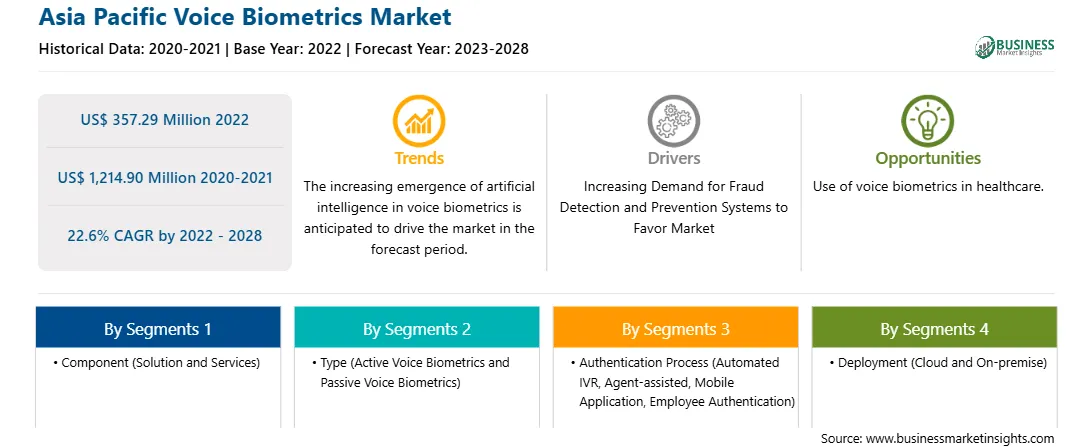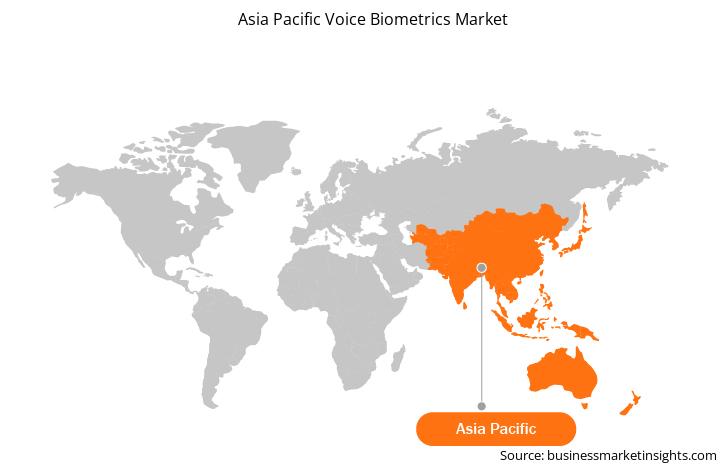Banks are leading in terms of having the best authentication methods to combat online fraud. Authentication mechanisms based on knowledge, such as PINs, passwords, and one-time passwords, have been employed by banks in the past. Further, banking security was affected by the demand for contactless and seamless technologies due to the COVID-19 pandemic. With the advent of digitization in the financial business, fraudulent activities are rising alarmingly. Fraudsters with access to banking credentials get access to clients' bank accounts due to high-profile data thefts, necessitating a second or third degree of protection in the entire financial authentication system. Banks and financial institutions benefit from speech biometrics technologies that intelligently identify users based on their voiceprints. Unlike typical text passwords and pins, voiceprints are unique to each user. Furthermore, cyber-attacks in the financial industry are increasing as attackers/hackers are becoming more skilled, and the number of potential targets or entry points is expanding. With the continuing growth and incorporation of new banking and financial technology, the total number of users is also growing dramatically. For instance, the Reserve Bank of India (RBI) reported ~7,400 bank fraud incidents in India in 2021. In 2020, the RBI reported 8,700 bank fraud instances in India, totaling US$ 24,06,76,30,500. Furthermore, according to the Indian Computer Emergency Response Team (CERT-In), 246,514 and 290,445 cyber security incidents involving digital banking were reported in India in 2019 and 2020, respectively. Voice biometrics simplifies user identification and authentication while improving know your customer (KYC) management due to automatic calibration, active and passive authentication, liveliness detection, and panic detection. Further, voice biometrics potentially help improve KYC procedures. People in multilingual countries such as South Asian countries have diverse degrees of schooling in different parts of the country. Voice biometrics help include such people in a financial safety net because the solutions are language-independent. Thus, the increasing demand for fraud detection and prevention system in the BFSI industry is driving the growth of the voice biometrics market.
Strategic insights for the Asia Pacific Voice Biometrics provides data-driven analysis of the industry landscape, including current trends, key players, and regional nuances. These insights offer actionable recommendations, enabling readers to differentiate themselves from competitors by identifying untapped segments or developing unique value propositions. Leveraging data analytics, these insights help industry players anticipate the market shifts, whether investors, manufacturers, or other stakeholders. A future-oriented perspective is essential, helping stakeholders anticipate market shifts and position themselves for long-term success in this dynamic region. Ultimately, effective strategic insights empower readers to make informed decisions that drive profitability and achieve their business objectives within the market.

| Report Attribute | Details |
|---|---|
| Market size in 2022 | US$ 357.29 Million |
| Market Size by 2028 | US$ 1,214.90 Million |
| Global CAGR (2022 - 2028) | 22.6% |
| Historical Data | 2020-2021 |
| Forecast period | 2023-2028 |
| Segments Covered |
By Component
|
| Regions and Countries Covered | Asia-Pacific
|
| Market leaders and key company profiles |
The geographic scope of the Asia Pacific Voice Biometrics refers to the specific areas in which a business operates and competes. Understanding local distinctions, such as diverse consumer preferences (e.g., demand for specific plug types or battery backup durations), varying economic conditions, and regulatory environments, is crucial for tailoring strategies to specific markets. Businesses can expand their reach by identifying underserved areas or adapting their offerings to meet local demands. A clear market focus allows for more effective resource allocation, targeted marketing campaigns, and better positioning against local competitors, ultimately driving growth in those targeted areas.

The Asia Pacific voice biometrics market is segmented into component, type, authentication process, deployment, vertical, application, and country. Based on component, the Asia Pacific voice biometrics market is bifurcated into solution and services. The solution segment dominated the market in 2022. Based on type, the Asia Pacific voice biometrics market is bifurcated into active voice biometrics and passive voice biometrics. The passive voice biometrics segment dominated the market in 2022. Based on authentication process, the Asia Pacific voice biometrics market is segmented into automated IVR, agent-assisted, mobile applications, and employee authentication. The agent-assisted segment dominated the market in 2022. Based on deployment, the Asia Pacific voice biometrics market is bifurcated into cloud and on-premise. The cloud segment dominated the market in 2022. Based on vertical, the Asia Pacific voice biometrics is segmented into BFSI, retail & e-commerce, government & defense, IT & telecom, healthcare & life sciences, transportation & logistics, travel & hospitality, energy & utilities, and others. The BFSI segment dominated the market in 2022. Based on application, the Asia Pacific voice biometrics market is categorized into authentication and customer verification, forensic voice analysis and criminal investigation, fraud detection and prevention, risk and emergency management, transaction processing, access control, workforce management, and others. The authentication and customer verification segment dominated the market in 2022. Based on country, the Asia Pacific voice biometrics market is segmented into China, Japan, India, South Korea, Australia, and the Rest of Asia Pacific. Further, China dominated the market in 2022.
A few of the key players dominating the Asia Pacific voice biometrics market are Auraya, Inc.; Aware Inc; NICE Ltd; Nuance Communications, Inc; and Verint Systems, Inc.
The Asia Pacific Voice Biometrics Market is valued at US$ 357.29 Million in 2022, it is projected to reach US$ 1,214.90 Million by 2028.
As per our report Asia Pacific Voice Biometrics Market, the market size is valued at US$ 357.29 Million in 2022, projecting it to reach US$ 1,214.90 Million by 2028. This translates to a CAGR of approximately 22.6% during the forecast period.
The Asia Pacific Voice Biometrics Market report typically cover these key segments-
The historic period, base year, and forecast period can vary slightly depending on the specific market research report. However, for the Asia Pacific Voice Biometrics Market report:
The Asia Pacific Voice Biometrics Market is populated by several key players, each contributing to its growth and innovation. Some of the major players include:
The Asia Pacific Voice Biometrics Market report is valuable for diverse stakeholders, including:
Essentially, anyone involved in or considering involvement in the Asia Pacific Voice Biometrics Market value chain can benefit from the information contained in a comprehensive market report.